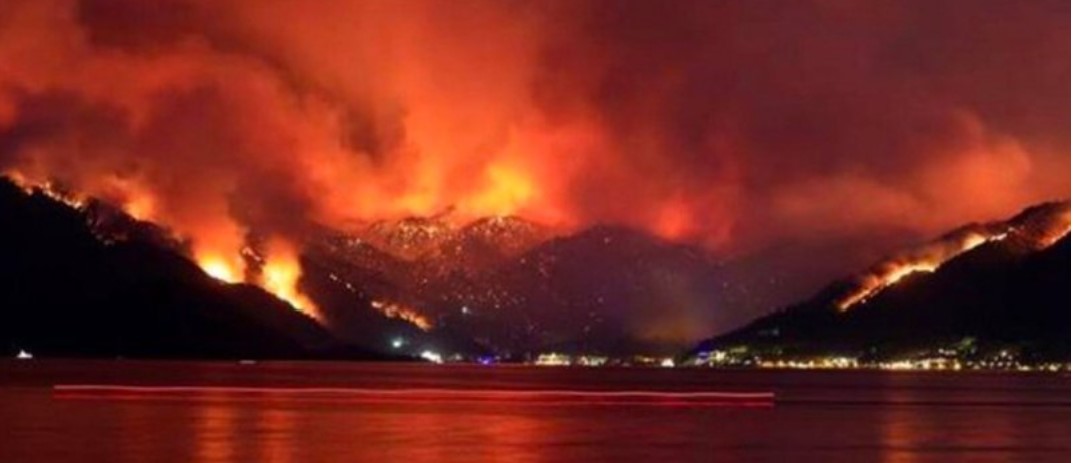As Turkish fire crews pressed ahead Tuesday with their weeklong battle against blazes tearing through forests and villages on the country’s southern coast, President Recep Tayyip Erdogan’s government faced increased criticism over its apparent poor response and inadequate preparedness for large-scale wildfires.
Fed by strong winds and scorching temperatures, the fires that began Wednesday have left eight people dead, forced thousands of residents and tourists to flee homes or vacation resorts in boats or convoys of cars and trucks. Charred and blackened trees have replaced some of the pine-coated hills in Turkey’s Turquoise Coast while many villagers lost homes and livestock.
Firefighters on Tuesday were still tackling nine fires in the coastal provinces of Antalya and Mugla that are popular tourist destinations. Other active fires were reported in the provinces of Adana and Isparta. In all, 137 fires that broke out in over 30 provinces since Wednesday have been put out, officials said.
A senior Turkish forestry official described the wildfires as the worst in Turkey in living memory, though he could not say how many acres of forest land the fires had devoured. He also could not estimate how long it would take the crews to put the fires out, saying strong winds were reigniting flames that had previously been brought under control. The official spoke on condition of anonymity in line with government regulations.
As residents lost homes and livestock, anger turned toward the government, which admitted that it did not have a usable firefighting aircraft fleet. Opposition parties accused the government of failing to procure firefighting planes and instead spending money for construction projects that they say harmful the environment.
In the village of Bozalan, in Mugla province, where homes and olive groves were incinerated, residents complained that the government’s response was inadequate.
“Our fire-extinguishing helicopters were insufficient,” said 58-year-old Mahmut Sanli. “Our homes burned down. If there was a firefighting crew in our neighborhood, this wouldn’t have happened.”
WATCH: Devil’s Triangle in Turkey: Mafia-State-AKP | Real Turkey
Nevzat Yildirim, 30, said he had called authorities in Mugla pleading for help but “nothing came.”
“We tried to protect our own homes through our own means, by filling up buckets. We organized ourselves with neighbors, youths and saved our homes,” he said.
Erdogan’s government has also been accused of compromising firefighting efforts by refusing help from Western nations, including rival Greece, during the early stages of the fires. Agriculture and Forestry Minister Bekir Pakdemirli rejected that accusation, saying the government had only refused offers for small water-dumping planes.
WATCH: Turkish Politics Is Changing Rapidly | Real Turkey
The Israeli Embassy said Tuesday that Israel had offered to help but Turkish officials had refused the offer, saying the “situation is under control.” It said the offer still stands.
Mayors posted videos pleading for aerial firefighting responses to local wildfires while celebrities joined a social media campaign requesting foreign help to combat the blazes. The campaign drew an angry response from a top Erdogan aide, Fahrettin Altun, who said “Our Turkey is strong. Our state is standing strong.”
Erdogan himself was accused of insensitivity after he threw bags of tea at residents from a bus during a weekend visit to the fire-hit Antalya region.
Fire-dumping planes sent from Spain and Croatia were joining planes from Russia, Iran, Ukraine and Azerbaijan on Tuesday. A total of 16 planes, 51 helicopters and more than 5,000 personnel were tackling the fires, officials said.
Health Minister Fahrettin Koca said 36 people in Mugla and 11 people in Antalya were still being treated in hospitals for fire-related injuries.
Authorities have launched investigations into the cause of the fires, including possible sabotage by Kurdish militants. Experts, however, mostly point to climate change as the culprit, along with accidents caused by people.
A heat wave across southern Europe, fed by hot air from North Africa, has led to wildfires across the Mediterranean, including in Italy and Greece.
The Turkish meteorology authority warned that temperatures would rise between 4 and 8 degrees Celsius above seasonal norms around the country’s Aegean and Mediterranean coasts.
Turkey expert Henry Barkey commented: The Erdogan administration, it appears, has no firefighting air assets to speak of. Most of its planes have not been serviced and are unsafe. As one independent columnist, Fehim Tastekin, pointed out, Greece has mobilized 39 aerial tankers to fight fires. Turkey has none, and is hoping that Russian and Spanish aircraft will come to help. This state of affairs has been compared to Erdogan’s 13-plane presidential fleet.
There is no question that this crisis and its mismanagement by Erdogan will take a tremendous toll on Turkish political stability and weaken the president’s hold. This, in turn, may force Erdogan to resort to desperate measures inside or outside the country in an effort to divert attention and rally people around him”.
Follow our English language YouTube videos @ REAL TURKEY: https://www.youtube.com/channel/UCKpFJB4GFiNkhmpVZQ_d9Rg
And content at Twitter: @AtillaEng
Facebook: Real Turkey Channel: https://www.facebook.com/realturkeychannel/
